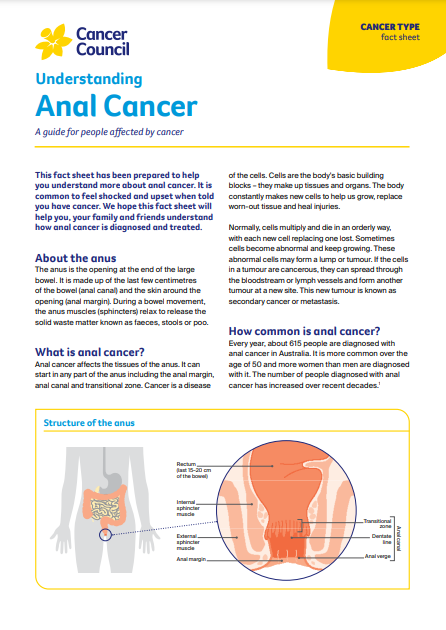- Home
- Anal cancer
- Life after treatment
After treatment for anal cancer
For most people, the cancer experience doesn’t end on the last day of treatment. Life after cancer treatment can present its own challenges. You may have mixed feelings when treatment ends, and worry that every ache and pain means the cancer is coming back.
Learn more about:
- Overview
- Follow-up appointments
- Dealing with feelings of sadness
- Looking after yourself
- If the cancer comes back
Overview
Some people say that they feel pressure to return to “normal life”. It is important to allow yourself time to adjust to the physical and emotional changes, and establish a new daily routine at your own pace. Your family and friends may also need time to adjust.
Cancer Council 13 11 20 can help you connect with other people who have had cancer, and provide you with information about the emotional and practical aspects of living well after cancer.
For more on this, see Living well after cancer.
Follow-up appointments
After treatment, you will need check-ups every 3–12 months for several years to confirm that the cancer hasn’t come back. Between visits, let your doctor know immediately if you have new symptoms in the anal region or any other health problems.
Dealing with feelings of sadness
If you have continued feelings of sadness, have trouble getting up in the morning or have lost motivation to do things that previously gave you pleasure, you may be experiencing depression. This is quite common among people who have had cancer.
Talk to your GP, as counselling or medication – even for a short time – may help. Some people can get a Medicare rebate for sessions with a psychologist. Ask your doctor if you are eligible. Cancer Council may also run a counselling program in your area.
For information about coping with depression and anxiety, call Beyond Blue on 1300 22 46 36. For 24-hour crisis support, call Lifeline 13 11 14.
The Thing About Cancer podcast
Listen to our podcast The Thing About Cancer for information and insights that can help you navigate through the challenges of living with cancer.
Looking after yourself
Cancer can cause physical and emotional strain, so it’s important to look after your wellbeing. Cancer Council has free booklets and programs to help you during and after treatment.
Call 13 11 20 to find out more, or see Managing cancer side effects, Exercise after a cancer diagnosis, Complementary therapies, Emotions and cancer, Nutrition and cancer, Sexuality, intimacy and cancer, Fertility and cancer, and Living well after cancer.
Alternative therapies are therapies used instead of conventional medical treatments. These are unlikely to be scientifically tested and may prevent successful treatment of the cancer. Cancer Council does not recommend the use of alternative therapies as a cancer treatment.
If the cancer comes back
For some people, anal cancer does come back after treatment. This is known as a recurrence. Depending on where the cancer comes back, treatment may include surgery, chemoradiation or chemotherapy.
In some cases of advanced cancer, treatment will focus on managing any symptoms, such as pain, and improving quality of life without trying to cure the disease. This is called palliative treatment.
Watch this video to see why eating well is so important after a cancer diagnosis, and what you can do to maintain a healthy diet.
Research shows that exercise benefits people with cancer during and after treatment. Find out more in this video or see our other exercise videos.
More resources
Glen Guerra, Colorectal Surgeon, Peter MacCallum Cancer Centre and St Vincents Hospital Melbourne, VIC; Holly Davey, 13 11 20 Consultant, Cancer Council Queensland; Prof Peter Gibbs, Laboratory Head, Walter and Eliza Hall Institute, The University of Melbourne, Medical Oncologist, Western Hospital, VIC; A/Prof Ian Faragher, The University of Melbourne, Head of Colorectal and General Surgery Unit, Western Health, VIC; Justin Hargreaves, Medical Oncology Nurse Practitioner, Bendigo Health Cancer Centre, VIC; Prof Richard Hillman, Senior Staff Specialist, HIV and Immunology, St Vincent’s Health Network, Sydney, Conjoint Professor, St Vincent’s Clinical Campus and The Kirby Institute, NSW; A/Prof George Hruby, Radiation Oncologist, Royal North Shore Hospital, Visiting Radiation Oncologist, Genesiscare and Dubbo Base Hospital, NSW; Annie Jacobs, Consumer; Mariad O’Gorman, Clinical Psychologist, Bankstown Cancer Therapy Centre, NSW; Terry Scully, Consumer.
View the Cancer Council NSW editorial policy.
View all publications or call 13 11 20 for free printed copies.

